Cooperative Approach Helps Healthcare Professionals
VerifiedAdded on 2022/08/19
|6
|1579
|14
AI Summary
Contribute Materials
Your contribution can guide someone’s learning journey. Share your
documents today.

Running head: ESSAY
Nursing
Name of the Student
Name of the University
Author Note
Nursing
Name of the Student
Name of the University
Author Note
Secure Best Marks with AI Grader
Need help grading? Try our AI Grader for instant feedback on your assignments.
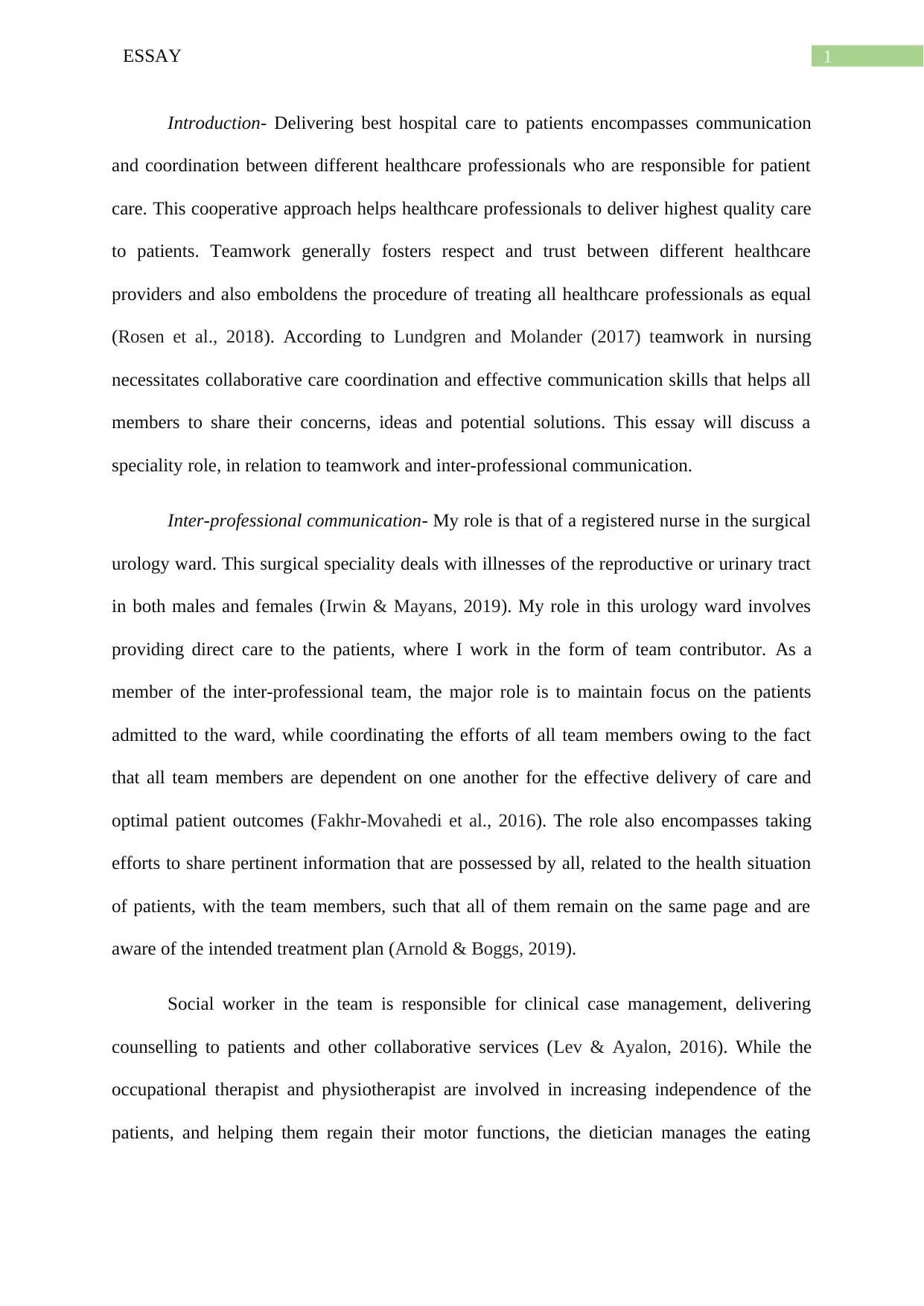
1ESSAY
Introduction- Delivering best hospital care to patients encompasses communication
and coordination between different healthcare professionals who are responsible for patient
care. This cooperative approach helps healthcare professionals to deliver highest quality care
to patients. Teamwork generally fosters respect and trust between different healthcare
providers and also emboldens the procedure of treating all healthcare professionals as equal
(Rosen et al., 2018). According to Lundgren and Molander (2017) teamwork in nursing
necessitates collaborative care coordination and effective communication skills that helps all
members to share their concerns, ideas and potential solutions. This essay will discuss a
speciality role, in relation to teamwork and inter-professional communication.
Inter-professional communication- My role is that of a registered nurse in the surgical
urology ward. This surgical speciality deals with illnesses of the reproductive or urinary tract
in both males and females (Irwin & Mayans, 2019). My role in this urology ward involves
providing direct care to the patients, where I work in the form of team contributor. As a
member of the inter-professional team, the major role is to maintain focus on the patients
admitted to the ward, while coordinating the efforts of all team members owing to the fact
that all team members are dependent on one another for the effective delivery of care and
optimal patient outcomes (Fakhr-Movahedi et al., 2016). The role also encompasses taking
efforts to share pertinent information that are possessed by all, related to the health situation
of patients, with the team members, such that all of them remain on the same page and are
aware of the intended treatment plan (Arnold & Boggs, 2019).
Social worker in the team is responsible for clinical case management, delivering
counselling to patients and other collaborative services (Lev & Ayalon, 2016). While the
occupational therapist and physiotherapist are involved in increasing independence of the
patients, and helping them regain their motor functions, the dietician manages the eating
Introduction- Delivering best hospital care to patients encompasses communication
and coordination between different healthcare professionals who are responsible for patient
care. This cooperative approach helps healthcare professionals to deliver highest quality care
to patients. Teamwork generally fosters respect and trust between different healthcare
providers and also emboldens the procedure of treating all healthcare professionals as equal
(Rosen et al., 2018). According to Lundgren and Molander (2017) teamwork in nursing
necessitates collaborative care coordination and effective communication skills that helps all
members to share their concerns, ideas and potential solutions. This essay will discuss a
speciality role, in relation to teamwork and inter-professional communication.
Inter-professional communication- My role is that of a registered nurse in the surgical
urology ward. This surgical speciality deals with illnesses of the reproductive or urinary tract
in both males and females (Irwin & Mayans, 2019). My role in this urology ward involves
providing direct care to the patients, where I work in the form of team contributor. As a
member of the inter-professional team, the major role is to maintain focus on the patients
admitted to the ward, while coordinating the efforts of all team members owing to the fact
that all team members are dependent on one another for the effective delivery of care and
optimal patient outcomes (Fakhr-Movahedi et al., 2016). The role also encompasses taking
efforts to share pertinent information that are possessed by all, related to the health situation
of patients, with the team members, such that all of them remain on the same page and are
aware of the intended treatment plan (Arnold & Boggs, 2019).
Social worker in the team is responsible for clinical case management, delivering
counselling to patients and other collaborative services (Lev & Ayalon, 2016). While the
occupational therapist and physiotherapist are involved in increasing independence of the
patients, and helping them regain their motor functions, the dietician manages the eating
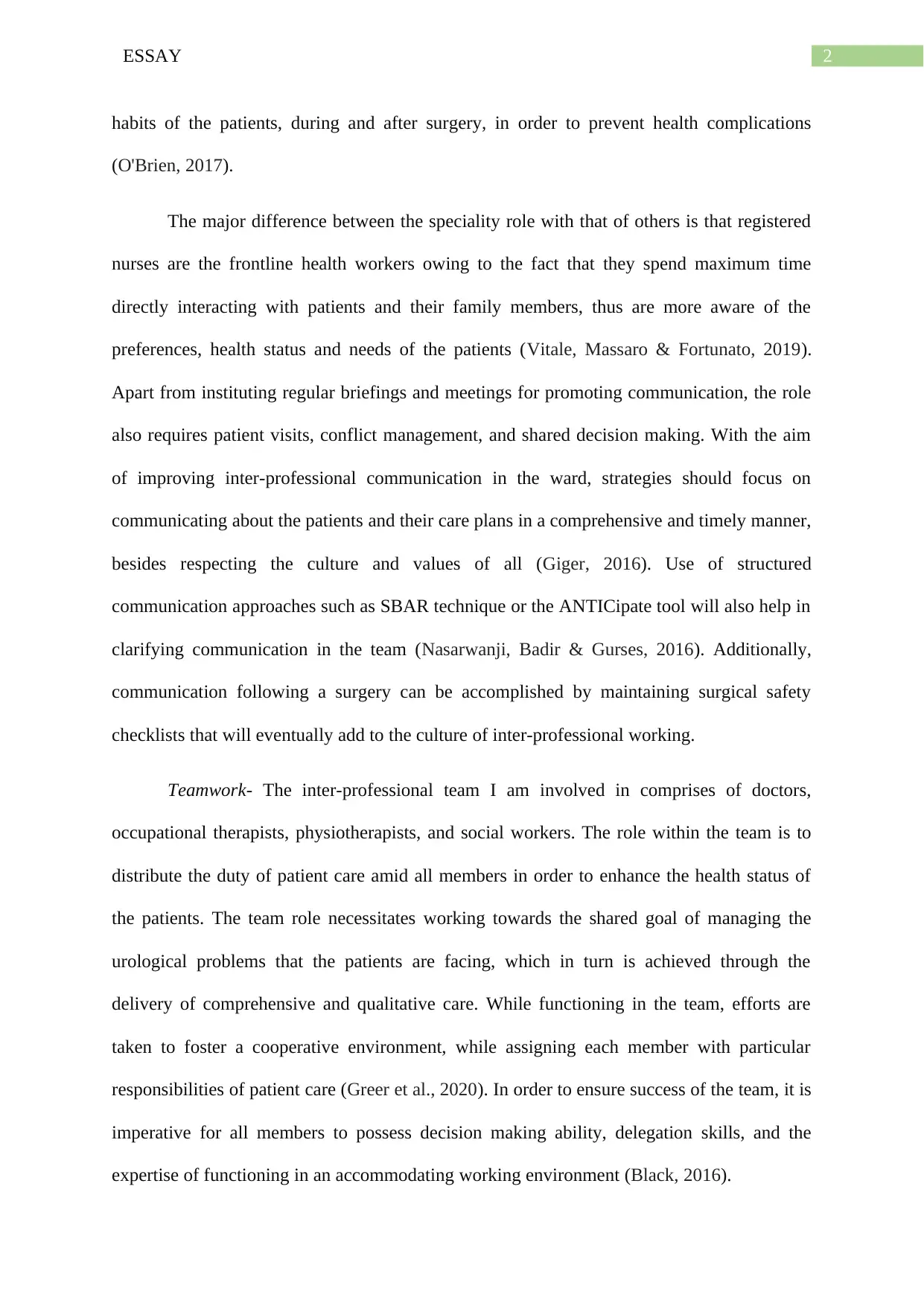
2ESSAY
habits of the patients, during and after surgery, in order to prevent health complications
(O'Brien, 2017).
The major difference between the speciality role with that of others is that registered
nurses are the frontline health workers owing to the fact that they spend maximum time
directly interacting with patients and their family members, thus are more aware of the
preferences, health status and needs of the patients (Vitale, Massaro & Fortunato, 2019).
Apart from instituting regular briefings and meetings for promoting communication, the role
also requires patient visits, conflict management, and shared decision making. With the aim
of improving inter-professional communication in the ward, strategies should focus on
communicating about the patients and their care plans in a comprehensive and timely manner,
besides respecting the culture and values of all (Giger, 2016). Use of structured
communication approaches such as SBAR technique or the ANTICipate tool will also help in
clarifying communication in the team (Nasarwanji, Badir & Gurses, 2016). Additionally,
communication following a surgery can be accomplished by maintaining surgical safety
checklists that will eventually add to the culture of inter-professional working.
Teamwork- The inter-professional team I am involved in comprises of doctors,
occupational therapists, physiotherapists, and social workers. The role within the team is to
distribute the duty of patient care amid all members in order to enhance the health status of
the patients. The team role necessitates working towards the shared goal of managing the
urological problems that the patients are facing, which in turn is achieved through the
delivery of comprehensive and qualitative care. While functioning in the team, efforts are
taken to foster a cooperative environment, while assigning each member with particular
responsibilities of patient care (Greer et al., 2020). In order to ensure success of the team, it is
imperative for all members to possess decision making ability, delegation skills, and the
expertise of functioning in an accommodating working environment (Black, 2016).
habits of the patients, during and after surgery, in order to prevent health complications
(O'Brien, 2017).
The major difference between the speciality role with that of others is that registered
nurses are the frontline health workers owing to the fact that they spend maximum time
directly interacting with patients and their family members, thus are more aware of the
preferences, health status and needs of the patients (Vitale, Massaro & Fortunato, 2019).
Apart from instituting regular briefings and meetings for promoting communication, the role
also requires patient visits, conflict management, and shared decision making. With the aim
of improving inter-professional communication in the ward, strategies should focus on
communicating about the patients and their care plans in a comprehensive and timely manner,
besides respecting the culture and values of all (Giger, 2016). Use of structured
communication approaches such as SBAR technique or the ANTICipate tool will also help in
clarifying communication in the team (Nasarwanji, Badir & Gurses, 2016). Additionally,
communication following a surgery can be accomplished by maintaining surgical safety
checklists that will eventually add to the culture of inter-professional working.
Teamwork- The inter-professional team I am involved in comprises of doctors,
occupational therapists, physiotherapists, and social workers. The role within the team is to
distribute the duty of patient care amid all members in order to enhance the health status of
the patients. The team role necessitates working towards the shared goal of managing the
urological problems that the patients are facing, which in turn is achieved through the
delivery of comprehensive and qualitative care. While functioning in the team, efforts are
taken to foster a cooperative environment, while assigning each member with particular
responsibilities of patient care (Greer et al., 2020). In order to ensure success of the team, it is
imperative for all members to possess decision making ability, delegation skills, and the
expertise of functioning in an accommodating working environment (Black, 2016).
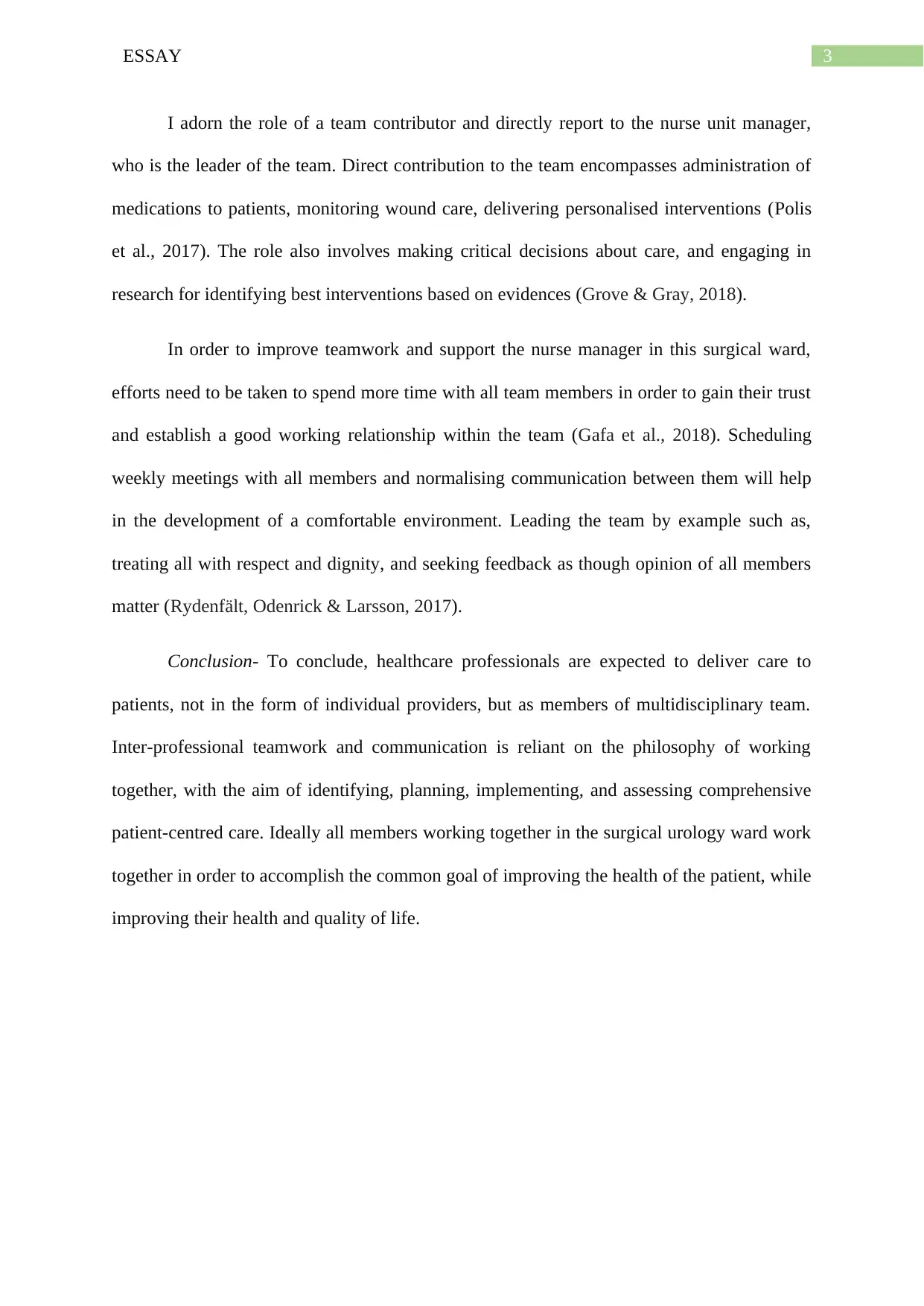
3ESSAY
I adorn the role of a team contributor and directly report to the nurse unit manager,
who is the leader of the team. Direct contribution to the team encompasses administration of
medications to patients, monitoring wound care, delivering personalised interventions (Polis
et al., 2017). The role also involves making critical decisions about care, and engaging in
research for identifying best interventions based on evidences (Grove & Gray, 2018).
In order to improve teamwork and support the nurse manager in this surgical ward,
efforts need to be taken to spend more time with all team members in order to gain their trust
and establish a good working relationship within the team (Gafa et al., 2018). Scheduling
weekly meetings with all members and normalising communication between them will help
in the development of a comfortable environment. Leading the team by example such as,
treating all with respect and dignity, and seeking feedback as though opinion of all members
matter (Rydenfält, Odenrick & Larsson, 2017).
Conclusion- To conclude, healthcare professionals are expected to deliver care to
patients, not in the form of individual providers, but as members of multidisciplinary team.
Inter-professional teamwork and communication is reliant on the philosophy of working
together, with the aim of identifying, planning, implementing, and assessing comprehensive
patient-centred care. Ideally all members working together in the surgical urology ward work
together in order to accomplish the common goal of improving the health of the patient, while
improving their health and quality of life.
I adorn the role of a team contributor and directly report to the nurse unit manager,
who is the leader of the team. Direct contribution to the team encompasses administration of
medications to patients, monitoring wound care, delivering personalised interventions (Polis
et al., 2017). The role also involves making critical decisions about care, and engaging in
research for identifying best interventions based on evidences (Grove & Gray, 2018).
In order to improve teamwork and support the nurse manager in this surgical ward,
efforts need to be taken to spend more time with all team members in order to gain their trust
and establish a good working relationship within the team (Gafa et al., 2018). Scheduling
weekly meetings with all members and normalising communication between them will help
in the development of a comfortable environment. Leading the team by example such as,
treating all with respect and dignity, and seeking feedback as though opinion of all members
matter (Rydenfält, Odenrick & Larsson, 2017).
Conclusion- To conclude, healthcare professionals are expected to deliver care to
patients, not in the form of individual providers, but as members of multidisciplinary team.
Inter-professional teamwork and communication is reliant on the philosophy of working
together, with the aim of identifying, planning, implementing, and assessing comprehensive
patient-centred care. Ideally all members working together in the surgical urology ward work
together in order to accomplish the common goal of improving the health of the patient, while
improving their health and quality of life.
Secure Best Marks with AI Grader
Need help grading? Try our AI Grader for instant feedback on your assignments.
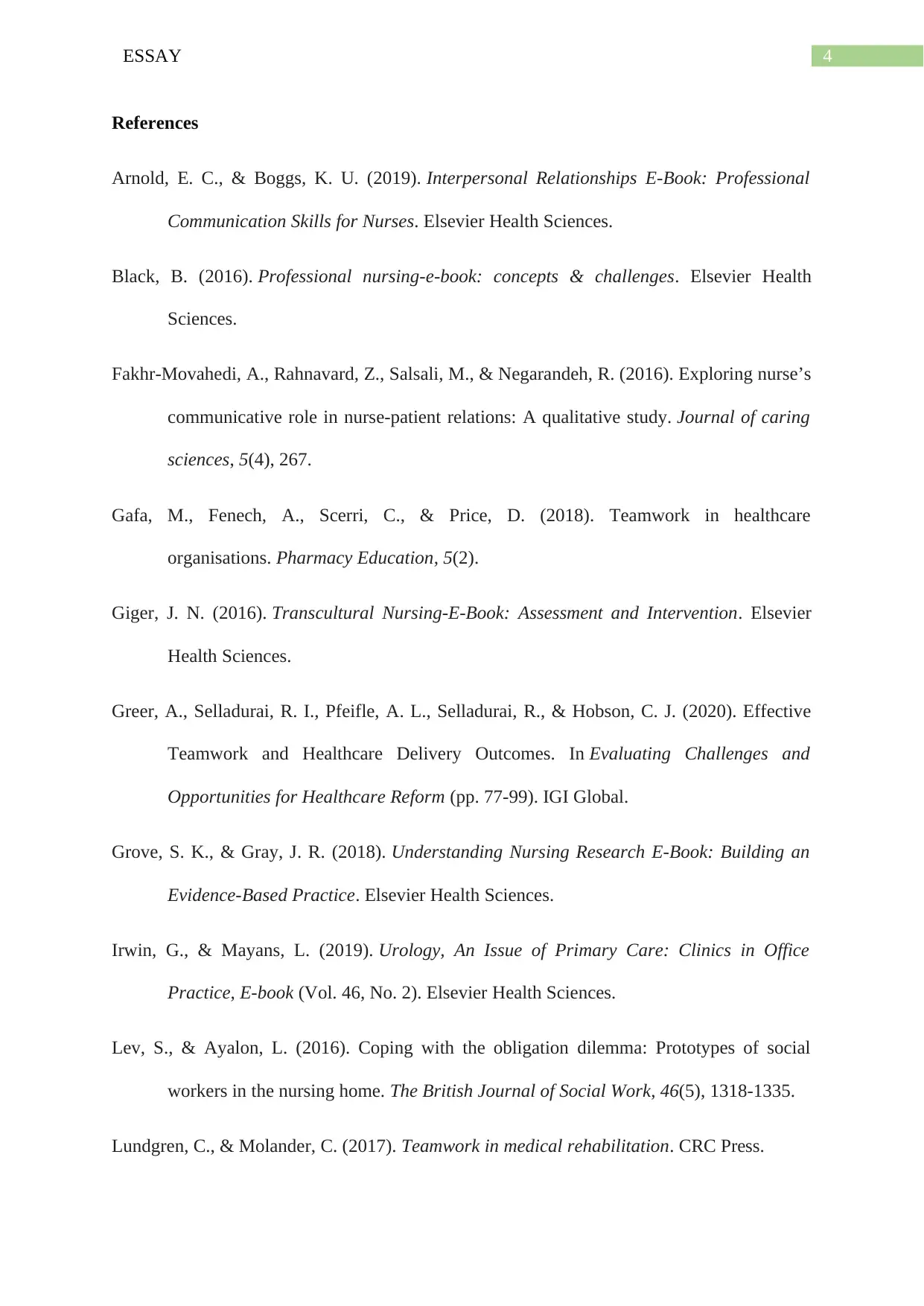
4ESSAY
References
Arnold, E. C., & Boggs, K. U. (2019). Interpersonal Relationships E-Book: Professional
Communication Skills for Nurses. Elsevier Health Sciences.
Black, B. (2016). Professional nursing-e-book: concepts & challenges. Elsevier Health
Sciences.
Fakhr-Movahedi, A., Rahnavard, Z., Salsali, M., & Negarandeh, R. (2016). Exploring nurse’s
communicative role in nurse-patient relations: A qualitative study. Journal of caring
sciences, 5(4), 267.
Gafa, M., Fenech, A., Scerri, C., & Price, D. (2018). Teamwork in healthcare
organisations. Pharmacy Education, 5(2).
Giger, J. N. (2016). Transcultural Nursing-E-Book: Assessment and Intervention. Elsevier
Health Sciences.
Greer, A., Selladurai, R. I., Pfeifle, A. L., Selladurai, R., & Hobson, C. J. (2020). Effective
Teamwork and Healthcare Delivery Outcomes. In Evaluating Challenges and
Opportunities for Healthcare Reform (pp. 77-99). IGI Global.
Grove, S. K., & Gray, J. R. (2018). Understanding Nursing Research E-Book: Building an
Evidence-Based Practice. Elsevier Health Sciences.
Irwin, G., & Mayans, L. (2019). Urology, An Issue of Primary Care: Clinics in Office
Practice, E-book (Vol. 46, No. 2). Elsevier Health Sciences.
Lev, S., & Ayalon, L. (2016). Coping with the obligation dilemma: Prototypes of social
workers in the nursing home. The British Journal of Social Work, 46(5), 1318-1335.
Lundgren, C., & Molander, C. (2017). Teamwork in medical rehabilitation. CRC Press.
References
Arnold, E. C., & Boggs, K. U. (2019). Interpersonal Relationships E-Book: Professional
Communication Skills for Nurses. Elsevier Health Sciences.
Black, B. (2016). Professional nursing-e-book: concepts & challenges. Elsevier Health
Sciences.
Fakhr-Movahedi, A., Rahnavard, Z., Salsali, M., & Negarandeh, R. (2016). Exploring nurse’s
communicative role in nurse-patient relations: A qualitative study. Journal of caring
sciences, 5(4), 267.
Gafa, M., Fenech, A., Scerri, C., & Price, D. (2018). Teamwork in healthcare
organisations. Pharmacy Education, 5(2).
Giger, J. N. (2016). Transcultural Nursing-E-Book: Assessment and Intervention. Elsevier
Health Sciences.
Greer, A., Selladurai, R. I., Pfeifle, A. L., Selladurai, R., & Hobson, C. J. (2020). Effective
Teamwork and Healthcare Delivery Outcomes. In Evaluating Challenges and
Opportunities for Healthcare Reform (pp. 77-99). IGI Global.
Grove, S. K., & Gray, J. R. (2018). Understanding Nursing Research E-Book: Building an
Evidence-Based Practice. Elsevier Health Sciences.
Irwin, G., & Mayans, L. (2019). Urology, An Issue of Primary Care: Clinics in Office
Practice, E-book (Vol. 46, No. 2). Elsevier Health Sciences.
Lev, S., & Ayalon, L. (2016). Coping with the obligation dilemma: Prototypes of social
workers in the nursing home. The British Journal of Social Work, 46(5), 1318-1335.
Lundgren, C., & Molander, C. (2017). Teamwork in medical rehabilitation. CRC Press.
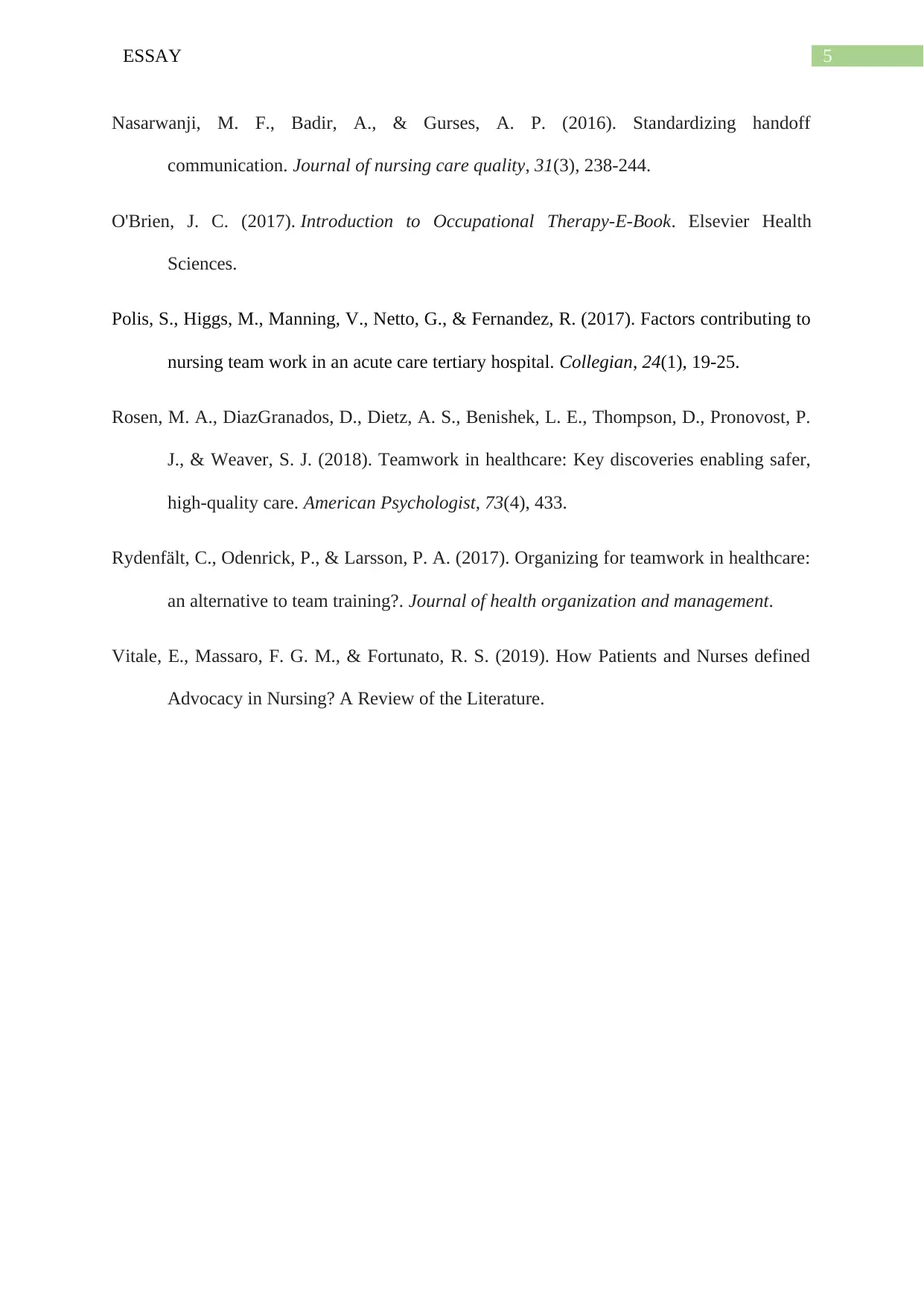
5ESSAY
Nasarwanji, M. F., Badir, A., & Gurses, A. P. (2016). Standardizing handoff
communication. Journal of nursing care quality, 31(3), 238-244.
O'Brien, J. C. (2017). Introduction to Occupational Therapy-E-Book. Elsevier Health
Sciences.
Polis, S., Higgs, M., Manning, V., Netto, G., & Fernandez, R. (2017). Factors contributing to
nursing team work in an acute care tertiary hospital. Collegian, 24(1), 19-25.
Rosen, M. A., DiazGranados, D., Dietz, A. S., Benishek, L. E., Thompson, D., Pronovost, P.
J., & Weaver, S. J. (2018). Teamwork in healthcare: Key discoveries enabling safer,
high-quality care. American Psychologist, 73(4), 433.
Rydenfält, C., Odenrick, P., & Larsson, P. A. (2017). Organizing for teamwork in healthcare:
an alternative to team training?. Journal of health organization and management.
Vitale, E., Massaro, F. G. M., & Fortunato, R. S. (2019). How Patients and Nurses defined
Advocacy in Nursing? A Review of the Literature.
Nasarwanji, M. F., Badir, A., & Gurses, A. P. (2016). Standardizing handoff
communication. Journal of nursing care quality, 31(3), 238-244.
O'Brien, J. C. (2017). Introduction to Occupational Therapy-E-Book. Elsevier Health
Sciences.
Polis, S., Higgs, M., Manning, V., Netto, G., & Fernandez, R. (2017). Factors contributing to
nursing team work in an acute care tertiary hospital. Collegian, 24(1), 19-25.
Rosen, M. A., DiazGranados, D., Dietz, A. S., Benishek, L. E., Thompson, D., Pronovost, P.
J., & Weaver, S. J. (2018). Teamwork in healthcare: Key discoveries enabling safer,
high-quality care. American Psychologist, 73(4), 433.
Rydenfält, C., Odenrick, P., & Larsson, P. A. (2017). Organizing for teamwork in healthcare:
an alternative to team training?. Journal of health organization and management.
Vitale, E., Massaro, F. G. M., & Fortunato, R. S. (2019). How Patients and Nurses defined
Advocacy in Nursing? A Review of the Literature.
1 out of 6
Related Documents
Your All-in-One AI-Powered Toolkit for Academic Success.
+13062052269
info@desklib.com
Available 24*7 on WhatsApp / Email
![[object Object]](/_next/static/media/star-bottom.7253800d.svg)
Unlock your academic potential
© 2024 | Zucol Services PVT LTD | All rights reserved.





